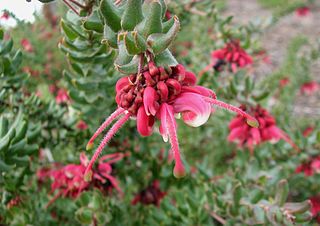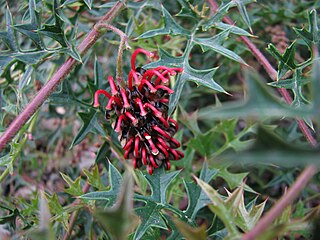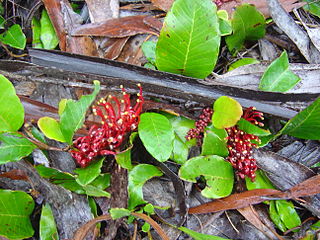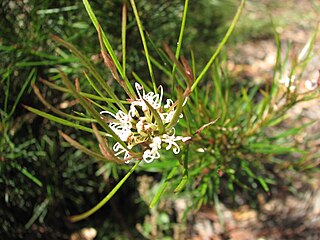
Grevillea lavandulacea, commonly known as lavender grevillea, is a species of flowering plant in the family Proteaceae and is endemic to southern continental Australia. It is a prostrate to spreading shrub with linear to elliptic leaves and clusters of pink to red flowers.

Grevillea baueri, commonly known as Bauer's grevillea, is a species of flowering plant in the family Proteaceae and is endemic to the coastal ranges of south-eastern New South Wales. It is a low, spreading to erect shrub with mostly oblong to egg-shaped leaves with red to pink and cream-coloured or yellow flowers.

Grevillea arenaria, commonly known as sand grevillea or hoary grevillea, is a species of flowering plant in the family Proteaceae and is endemic to New South Wales. It is a spreading shrub with elliptic to egg-shaped leaves with the narrower end towards the base, and red, pink or orange flowers.

Grevillea concinna, commonly known as red combs or elegant grevillea, is a species of flowering plant in the family Proteaceae and is endemic to the south-west of Western Australia. It is a spreading to erect shrub with mostly linear to narrow wedge-shaped leaves sometimes with a sharp point on the tip. Flower colour varies with subspecies.

Grevillea montis-cole, commonly known as Mount Cole grevillea, is a species of flowering plant in the family Proteaceae and is endemic to central-western Victoria, Australia. It is a shrub with divided leaves with 5 to 15 lobes, the end lobes more or less triangular to narrowly oblong and sharply-pointed, and clusters of greenish to fawn and dull purplish flowers.

Grevillea laurifolia, commonly known as laurel-leaf grevillea, is a species of flowering plant in the family Proteaceae and is endemic to New South Wales. It is a prostrate, trailing shrub with egg-shaped, heart-shaped or round leaves, and clusters of reddish to deep maroon flowers.

Grevillea irrasa is a species of flowering plant in the family Proteaceae and is endemic to south-eastern New South Wales. It is an erect, spreading shrub with oblong to egg-shaped leaves with the narrower end towards the base, and clusters of red to apricot-coloured flowers.

Grevillea oxyantha is a species of flowering plant in the family Proteaceae and is endemic to south-eastern continental Australia. It is an erect to spreading shrub with somewhat silky-hairy branchlets, broadly elliptic to broadly egg-shaped or almost round leaves, and hairy, crimson and pink flowers with a red style.

Grevillea neurophylla, commonly known as granite grevillea, is a species of flowering plant in the family Proteaceae and is endemic to south-eastern continental Australia. It is a spreading to erect shrub with linear leaves, and clusters of white to pale pink flowers with a strongly hooked style.
Grevillea parviflora, commonly known as small-flower grevillea, is a species of flowering plant in the family Proteaceae and is endemic to the Sydney region of eastern New South Wales. It is a low, dense, spreading to erect shrub with more or less linear leaves and white flowers with a red style that sometimes turns red as it ages.

Grevillea epicroca is a species of flowering plant in the family Proteaceae and is endemic to south-eastern New South Wales. It is a shrub with elliptic to lance-shaped leaves and red, silky-hairy flowers.
Grevillea kedumbensis is a species of flowering plant in the family Proteaceae and is endemic to a restricted locale in the Great Dividing Range in central New South Wales in Australia. It is a twiggy shrub with narrowly elliptic to egg-shaped leaves with the narrower end towards the base, and clusters of hairy green to cream-coloured flowers.
Grevillea obtusiflora is a species of flowering plant in the family Proteaceae and is endemic to a small area of eastern New South Wales. It is a low, spreading to erect shrub with many stems, narrowly elliptic to oblong or linear to narrowly egg-shaped leaves with the narrower end towards the base, and pinkish-red and cream-coloured flowers with a red style.

Grevillea plurijuga is a species of flowering plant in the family Proteaceae and is endemic to southern Western Australia. It is a prostrate to low-lying or dense mounded to erect shrub with divided leaves with linear lobes and loose clusters of hairy, red or pink flowers.

Grevillea ramosissima, commonly known as fan grevillea, is a species of flowering plant in the family Proteaceae and is endemic to eastern continental Australia. It is a low, spreading shrub with lobed leaves and clusters of cream-coloured to pale yellow flowers.

Grevillea humilis is a species of flowering plant in the family Proteaceae and is endemic to eastern New South Wales. It is an erect to spreading shrub with narrowly elliptic to more or less linear leaves, and pink or white flowers.
Grevillea granulifera is a species of flowering plant in the family Proteaceae and is endemic to eastern New South Wales. It is a shrub with narrowly elliptic leaves and clusters of pinkish-red and creamy-white flowers.

Grevillea amplexans is a species of flowering plant in the family Proteaceae and is endemic to the Mid West region of Western Australia. It is a spreading shrub with arching branches, stem-clasping, sharply-pointed, lobed or toothed leaves and white to cream-coloured flowers.

Grevillea pauciflora, commonly known as the few-flowered grevillea, or as Port Lincoln grevillea in South Australia, is a species of flowering plant in the family Proteaceae and is endemic to the south of continental Australia. It is an erect to straggly or spreading shrub with linear to narrowly wedge-shaped leaves and red or orange flowers with a red or orange style.

Grevillea diffusa is a species of flowering plant in the family Proteaceae and is endemic to the Sydney region of New South Wales. It is a low, compact shrub with elliptic to linear leaves, and dark red, or dark crimson to scarlet and burgundy-coloured flowers.
















